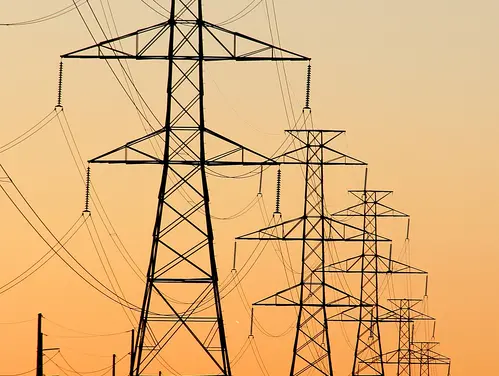Any electric transmission line above a certain voltage size (69,000 volts, also referred to as 69 kilovolts or 69 kV) that is located outside of the corporate limits of a city must have a franchise from the IUC before it can be built. The following information explains the process the IUC uses to consider whether to issue a franchise for a proposed line:
Informational meetings
If the proposed line will cross one mile or more of privately owned land, the first step in the process is to hold a public informational meeting in each affected county. Scheduled informational meetings can be found on the IUC's Hearing and Meeting Calendar.
Regarding informational meetings, the following must occur:
- The company that proposes to build the line must give notice to anyone with an ownership interest in land that might be affected by the line.
- The meeting will be held in a public location that is accessible to all. The meeting time and date will be requested by the company and will be set upon approval by the IUC.
- A representative of the IUC will attend the meeting and present a summary of the legal rights of the landowners who may be affected by the line. See the IUC Electric Transmission Line Informational Meeting Handout. (271.58 KB) .pdf
- A company representative will explain the proposed project.
By law, the company cannot begin negotiating with landowners for right-of-way (easements) for the proposed line until after the meeting has adjourned.
By law, the company cannot file a petition for franchise with the IUC until at least 30 days after the final informational meeting has been held.
A public informational meeting is not a hearing. No record is made and no evidence is received. The purpose of the meeting is only to provide the public and landowners with information about the proposed transmission line and their rights.
Petition for franchise
Once a petition for franchise is filed and if it is determined to be substantially complete, there are two possible paths for the proceeding.
- If no objections are on file and the petitioner does not ask to be granted with the right of eminent domain, a notice is published two times in a newspaper of general circulation in the affected county. If no objections are filed within 20 days of the second publication, the franchise may be granted without a hearing.
- If objections are filed or eminent domain authority is requested, a hearing must be held. Notice of the hearing will be mailed to objectors and owners of affected property where eminent domain has been requested. Notice will also be published.
Hearing
When a proposed line is greater than one mile long, the hearing must be held in the county seat of the county that is located at the midpoint of the proposed line. (If the line is shorter than one mile, the hearing can be held at the IUC in Des Moines.)
The IUC or an administrative law judge will preside at the hearing. All parties may present evidence and testimony in support of or opposition to the electric line.
Ultimately, the IUC will decide whether the proposed line is necessary to serve a public use, represents a reasonable relationship to an overall plan of transmitting electricity in the public interest, complies with routing and engineering standards, and meets all other legal requirements.
If the company has requested the right of eminent domain, the IUC also will decide whether to grant that right. All parties may present evidence and testimony concerning eminent domain at the hearing.
At the hearing, the IUC (or the administrative law judge) is not the advocate for any other particular party; the agency is neutral. If you believe you need to be represented at the hearing, you should consult with your own lawyer.
When the IUC makes its final decision in the case, any party may file for judicial review of the decision in District Court.
Right-of-Way Concerns
In order to construct a transmission line on private property, the company must obtain necessary rights from the owner of the land, typically by means of an easement. An easement may be voluntary or, in some cases, it may be obtained through condemnation, also known as the power of eminent domain. See common questions about eminent domain.
The company cannot begin to negotiate with landowners for easements until after the informational meeting has been completed. The IUC does not supervise or control negotiations for the purchase of voluntary easements. After the informational meeting is held, the company and the landowners are free to negotiate.
If the company cannot obtain voluntary easements for the entire line, it may ask the IUC for the authority to take those rights through condemnation. Under federal and state law, private property cannot be taken for public use without 1) a demonstrated public purpose and 2) just compensation to the owner.
Under Iowa law, the IUC will determine whether a company has shown a need to serve a public use, but the IUC does not determine the question of just compensation. If condemnation is necessary, the question of compensation will be determined in an entirely separate proceeding by a Compensation Commission appointed for each county under Iowa Code chapter 6B.
